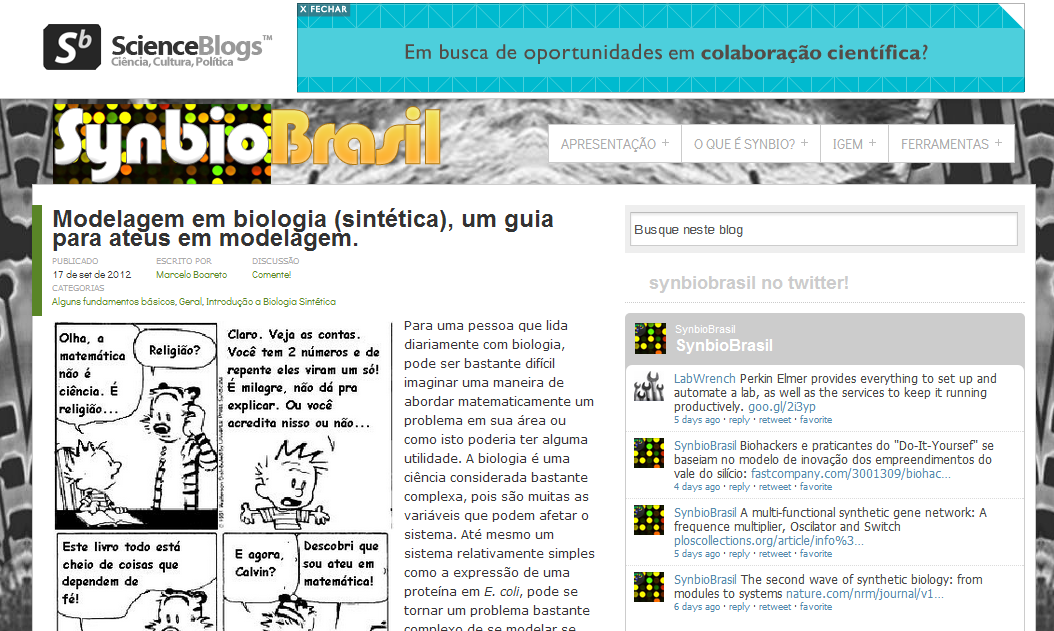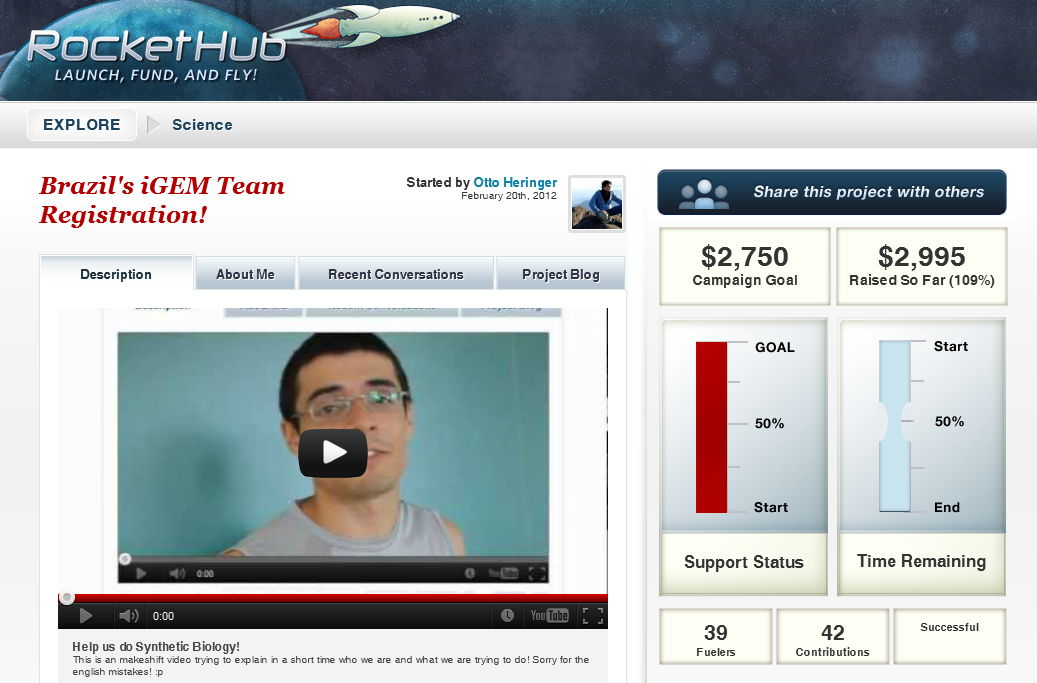Team:USP-UNESP-Brazil/ProjectOverview/HumanPratices
From 2012.igem.org
Andresochoa (Talk | contribs) |
|||
| (25 intermediate revisions not shown) | |||
| Line 1: | Line 1: | ||
| - | + | {{:Team:USP-UNESP-Brazil/Templates/Header}} | |
| - | + | =HUMAN PRACTICES= | |
| - | + | {{:Team:USP-UNESP-Brazil/Templates/RImage | image=0021.png | caption=Our blog | size=300px }} | |
| - | + | ||
| - | + | ||
| - | + | ||
| - | + | ||
| - | + | ||
| - | + | ||
| - | + | ||
| - | + | ||
| - | - | + | The main advance of this team in the Human Practice area is the generation of a blog where portuguese-speaking people can find reliable information about Synbio in their native language. Even though Synbio is an important trend in biotechnology, one that will probably have major impact in our society, the general public in Brazil still knows very little about of it. |
| - | + | In order to spread the word about Synbio, we have created the Biology Synthetic Club, which became the base of this iGEM team. That´s how the SynBio Brasil blog [http://scienceblogs.com.br/synbiobrasil/] was created and soon incorporated to the largest community of science blogs in Portuguese: ScienceBlogs Brasil [http://scienceblogs.com.br/]. The blog has been viewed more than '''10,000 times''' since January 2012 and remains as one of the only resources about SynBio in Portuguese. | |
| - | + | ||
| - | + | ||
| - | + | Besides the blog, the team has organized lectures and meetings, that were streamed online, where student, professors and | |
| + | interested people at university could share ideas. We discussed about synthetic biology and potential projects for the iGEM competition. This way we made contact with Fernando Lindenberg, from Unesp, who joined the initiative. | ||
| - | + | {{:Team:USP-UNESP-Brazil/Templates/RImage | image=0020.png | caption=Successfully crowdfunded! | size=300px }} | |
| - | + | ||
| - | - | + | The team has also raised money to register in this competition using crowdfunding [http://www.rockethub.com/projects/6131-brazil-s-igem-team-registration/about]. As it was the first scientific crowdfunded project in Brazil, it has arisen a lot of media attention. Our team was interviewed by the largest media organizations, thus arising awareness about SynBio in Brazil [http://www1.folha.uol.com.br/ciencia/1097202-cientistas-da-usp-conseguem-financiar-projeto-com-vaquinha-virtual.shtml][http://g1.globo.com/jornal-da-globo/noticia/2012/05/brasileiros-aderem-vaquinha-eletronica-para-realizar-projetos.html][http://revistapiaui.estadao.com.br/blogs/questoes-da-ciencia/geral/de-grao-em-grao]. |
| - | |||
| - | |||
| - | |||
| - | |||
| - | Our team became | + | == The beginning== |
| - | + | ||
| - | + | Our team was started by the researcher Mateus Lopes from ICB-USP, who had to leave the group and became a collaborator. Thus, the group became a students initiative, headed by two graduate students (Marcelo Boareto and Edgar Andrés Ochoa C.) and one undergraduate student (Otto Heringer). | |
| + | |||
| + | Mateus Lopes also created the Biology Synthetic Club, which was adopted by Otto Heringer. This Club became a multidisciplinary group. Our goal is to create a space that could be used for publishing and discussing about synthetic biology in Brazil. It also aims to keep the university participating in the iGEM competition. The Club developed the Synbio Brasil blog, which is an important tool for teaching and explaining synthetic biology research in Portuguese. | ||
| + | |||
| + | == Generating human resources== | ||
| + | |||
| + | Not only does Brazil lacks online resources about Synbio but also lack researchers developing projects in the area. This is the first time São Paulo University (USP) sends a team and the third Brazilian team in the iGEM competition. The projects were important for training students in the synthetic biology field and improve our theoretical and practical knowledge. | ||
| + | |||
| + | We divided the team in two wet laboratory groups, each one dedicated to one of the projects, and a third group in charged of the mathematical modelling for both projects. Each group had a graduate student (Luiza Lane de Barros Dantas, Edgar Andrés Ochoa C. and Marcelo Boareto) leading the undergraduated students, most of the undergraduate students had no practical experience in molecular biology. It was a wonderful experience that allowed to introduce the undergraduate students in the molecular biology and synthetic biology world, it was also an opportunity for the graduate students to beging to develop their own research projects focused in this area. | ||
| + | |||
| + | The iGEM competition led us to put together people from six laboratories (five at USP university and one at UNESP university) that want to work in synthetic biology, an almost unknown field in Brazil. This laboratories leaded by Carlos Takeshi Hotta, Marie Anne Van Sluys, Nestor Caticha, José Gregório Cabrera Gomez, Luiziana Ferreira da Silva and Cleslei Fernando Zanelli are pretty interested in lead this area in Brazil. | ||
| + | |||
| + | {{:Team:USP-UNESP-Brazil/Templates/Foot}} | ||
Latest revision as of 03:40, 27 September 2012
 Introduction
Introduction Project Overview
Project Overview Plasmid Plug&Play
Plasmid Plug&Play Associative Memory
Associative MemoryNetwork
 Extras
ExtrasHUMAN PRACTICES
The main advance of this team in the Human Practice area is the generation of a blog where portuguese-speaking people can find reliable information about Synbio in their native language. Even though Synbio is an important trend in biotechnology, one that will probably have major impact in our society, the general public in Brazil still knows very little about of it.
In order to spread the word about Synbio, we have created the Biology Synthetic Club, which became the base of this iGEM team. That´s how the SynBio Brasil blog [http://scienceblogs.com.br/synbiobrasil/] was created and soon incorporated to the largest community of science blogs in Portuguese: ScienceBlogs Brasil [http://scienceblogs.com.br/]. The blog has been viewed more than 10,000 times since January 2012 and remains as one of the only resources about SynBio in Portuguese.
Besides the blog, the team has organized lectures and meetings, that were streamed online, where student, professors and interested people at university could share ideas. We discussed about synthetic biology and potential projects for the iGEM competition. This way we made contact with Fernando Lindenberg, from Unesp, who joined the initiative.
The team has also raised money to register in this competition using crowdfunding [http://www.rockethub.com/projects/6131-brazil-s-igem-team-registration/about]. As it was the first scientific crowdfunded project in Brazil, it has arisen a lot of media attention. Our team was interviewed by the largest media organizations, thus arising awareness about SynBio in Brazil [http://www1.folha.uol.com.br/ciencia/1097202-cientistas-da-usp-conseguem-financiar-projeto-com-vaquinha-virtual.shtml][http://g1.globo.com/jornal-da-globo/noticia/2012/05/brasileiros-aderem-vaquinha-eletronica-para-realizar-projetos.html][http://revistapiaui.estadao.com.br/blogs/questoes-da-ciencia/geral/de-grao-em-grao].
The beginning
Our team was started by the researcher Mateus Lopes from ICB-USP, who had to leave the group and became a collaborator. Thus, the group became a students initiative, headed by two graduate students (Marcelo Boareto and Edgar Andrés Ochoa C.) and one undergraduate student (Otto Heringer).
Mateus Lopes also created the Biology Synthetic Club, which was adopted by Otto Heringer. This Club became a multidisciplinary group. Our goal is to create a space that could be used for publishing and discussing about synthetic biology in Brazil. It also aims to keep the university participating in the iGEM competition. The Club developed the Synbio Brasil blog, which is an important tool for teaching and explaining synthetic biology research in Portuguese.
Generating human resources
Not only does Brazil lacks online resources about Synbio but also lack researchers developing projects in the area. This is the first time São Paulo University (USP) sends a team and the third Brazilian team in the iGEM competition. The projects were important for training students in the synthetic biology field and improve our theoretical and practical knowledge.
We divided the team in two wet laboratory groups, each one dedicated to one of the projects, and a third group in charged of the mathematical modelling for both projects. Each group had a graduate student (Luiza Lane de Barros Dantas, Edgar Andrés Ochoa C. and Marcelo Boareto) leading the undergraduated students, most of the undergraduate students had no practical experience in molecular biology. It was a wonderful experience that allowed to introduce the undergraduate students in the molecular biology and synthetic biology world, it was also an opportunity for the graduate students to beging to develop their own research projects focused in this area.
The iGEM competition led us to put together people from six laboratories (five at USP university and one at UNESP university) that want to work in synthetic biology, an almost unknown field in Brazil. This laboratories leaded by Carlos Takeshi Hotta, Marie Anne Van Sluys, Nestor Caticha, José Gregório Cabrera Gomez, Luiziana Ferreira da Silva and Cleslei Fernando Zanelli are pretty interested in lead this area in Brazil.
 "
"

















